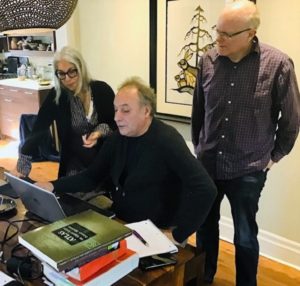Training with Anishinabek Nation researchers

By Laurie Leclair
Over the years, the Anishinabek Nation has recognized the need for specific claims research training within the communities. Although there is no identified funding for this type of endeavour, the Anishinabek Nation has worked with communities wherever possible to mentor or train staff that are wanting to learn about how to conduct historical research. While the emphasis is placed on those important collections and web sites that all claims researchers should be familiar with, each session is tailored to support the unique claims each community brings to the sessions. Based on the narrative of each claim, researchers may receive assistance in treaty work, survey and mapping, genealogy, lands registry or resource tracking.
At the request of Mark Peters, Historian, Munsee Delaware Nation, Leclair Historical Research (LHR) put together a three-day program that focussed on digital resources and guided study. As this was Peter’s second visit and there was more familiarity with Munsee Delaware Nation’s specific claims issues, there was greater ability to move beyond introductory sources. Following a day at LHR, day two involved a visit to the Special Collections Room at Metro Reference Library. In the past, researchers have also visited Ontario Archives, the Royal Ontario Museum and the University of Toronto. When time allows, participants are encouraged to go through the extensive holdings at LHR and take copies of whatever collections believed to be useful for their own specific claims.
If you are new to historical research but would like to learn more about your community, here are a few very interesting websites that you can visit from the comfort of your office or home.
Reviewing the Original Treaties:
Most people are familiar with the Coles reprint, Canada Treaties and Surrenders (Fifth House, 1992), which provides transcribed copies of treaties. But you can also review the original documents through Library and Archives Canada and Early Canadiana online. This priceless collection is available on microfilm reels T-9938, T-9939 and T-9941. Just go to the Canadiana Online and Héritage website and in the search window type in the reel number. The treaties go chronologically, so begin with T-9938 if you are searching an early agreement.
World War I Veterans:
Another interesting site to visit is the Library and Archives Canada’s Personnel Records of the First World War. To commemorate the centennial of World War I, records of those men and women who served have now been digitized and are available for download. The database is simple to use. Go to the ‘Library and Archives’ website to ‘Personnel Records of the First World War’. Click the ‘Search: Database’ button. From there you will put in your relatives’ First and Last names. When you download their files, you can follow almost every step that person made, from when they left Canada to when they hopefully returned.
Maps and Plans:
Lastly, Natural Resources Canada has placed all its plans and field books online. If you are interested in reviewing your community’s evolution through mapping, go to the Natural Resources Canada website to the Survey Plan Search page. Go directly to the ‘Canada Land’ window and type in your territory. Scroll down to click on the blue ‘Search’ button and you will be rewarded with dozens if not hundreds of .PDFs and .JPEGs of surveys and field notes.
These examples are just a few of the hundreds of databases now available to First Nation researchers. Records are being digitized at an incredibly fast pace. While this certainly facilitates research, it also democratizes it by enabling people to do quality, intensive work from their own desks. While not everything is available online, it is the proper place to start so that when community researchers do book trips to bricks and mortar institutions, they will have a strong working-knowledge of the sources and a certain degree of confidence in working through them. And knowing what is out there is the first step towards the decolonization of history.


